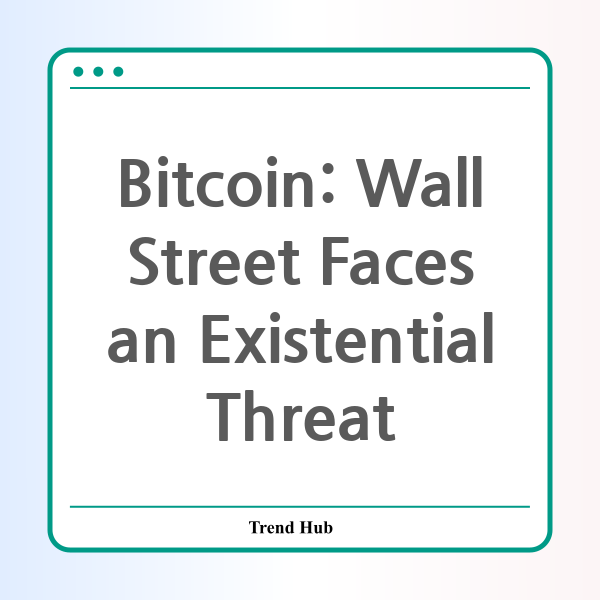* This website participates in the Amazon Affiliate Program and earns from qualifying purchases.

As the cryptocurrency market continues to rise and evolve, Bitcoin stands at the forefront of this financial revolution. Recently, Wall Street has been shaken, bracing for an unprecedented shift prompted by the proposed legislation surrounding cryptocurrencies and stablecoins. Are we witnessing the dawn of a new era in finance, or a mere blip on the radar?
Bitcoin's recent performance has outshone traditional stocks, creating a wave of concern among banking institutions. With the Trump administration's radical new proposals, the stakes have never been higher. According to industry experts, this scenario poses an "existential threat" to the banking sector and the entire financial system. The crux of the matter lies in how Congress is moving fast to implement new regulations, particularly focusing on stablecoins—cryptocurrencies pegged to traditional currencies like the U.S. dollar.
One significant aspect of this potential game-changer is the stablecoin legislation, which could introduce mechanisms for stablecoin issuers to provide interest to holders. This could incentivize investors to withdraw their funds from traditional banks, potentially destabilizing the banking system if these cryptocurrency firms were to fail.
Experts anticipate that should stablecoin accounts begin offering higher-than-average interest, we might see a significant migration of consumer funds from insured bank accounts into these digital alternatives. This could fundamentally alter the landscape of personal finance and banking as we know it, marking an important moment in how we engage with money.
"Stablecoins are emerging as the first real blockchain use case to be fully integrated into traditional finance," said a leading financial expert. The growing momentum in stablecoins is expected to draw institutional interest, with these digital assets poised to serve as a bridge between traditional financial assets and the cryptocurrency world.
As Congress deliberates on these two proposed stablecoin bills, lawmakers must navigate the implications of their decisions carefully. The outcome could determine whether stablecoins transition to become central checking account tools used by banks and crypto companies alike, or if they remain a secondary consideration in the finance sector.
Industry leaders have voiced their concerns over potential biases that could emerge from government interventions. Leading voices in the cryptocurrency space, such as certain CEOs, argue that it would be more equitable for both banks and crypto enterprises to have the opportunity to share interests with consumers, rather than favoring one industry.
In addition to regulatory implications, the adoption of stablecoins is already witnessing significant growth. Tether's USDT market cap has soared to approximately $144 billion, indicating a burgeoning space that traditional financial giants are eager to penetrate. Companies like PayPal and Bank of America are already exploring their own stablecoin offerings, drawn in by the substantial profits that Tether has generated in the previous year.
As the discussion advances, it is evident that cryptocurrencies and stablecoins are more than just financial assets; they are catalysts for a broader transformation in how we perceive and utilize money. The future of finance may very well hinge on the decisions made in Congress regarding these digital currencies. With Bitcoin leading the charge, both investors and everyday consumers must pay close attention to these developments.
In conclusion, the current trajectory of Bitcoin and stablecoins suggests a pivotal point in financial history. As we navigate these uncharted waters, how we adapt to and embrace these changes will determine the future landscape of banking and personal finance. Will we see cryptocurrencies solidifying their position in mainstream finance, or will traditional banking find ways to counter this emergent threat? Only time will tell.
* This website participates in the Amazon Affiliate Program and earns from qualifying purchases.